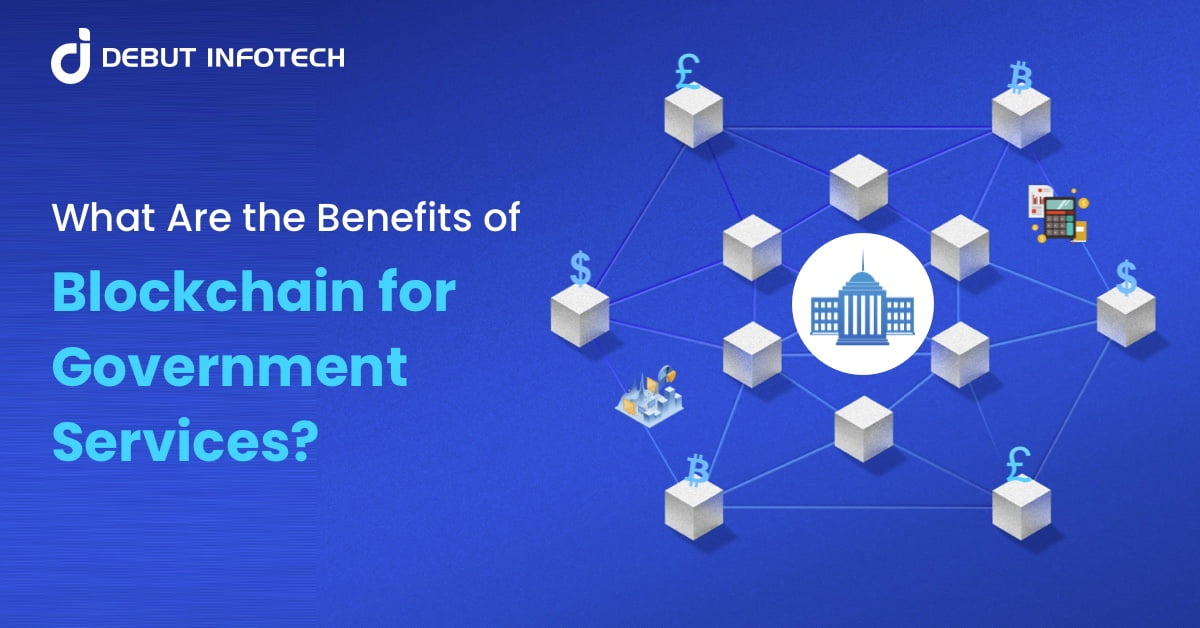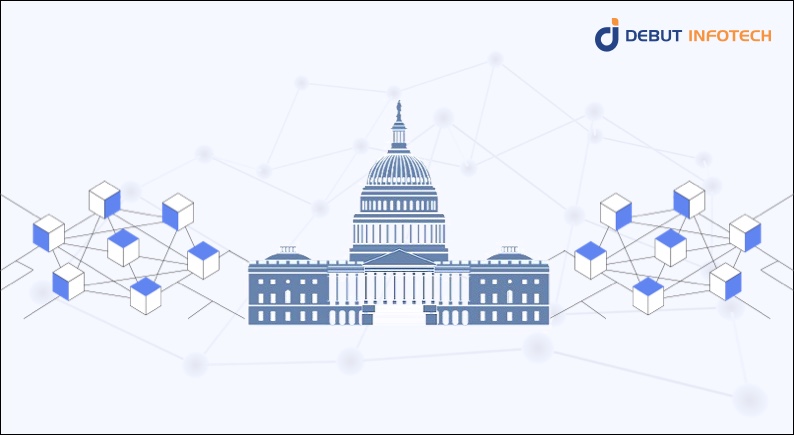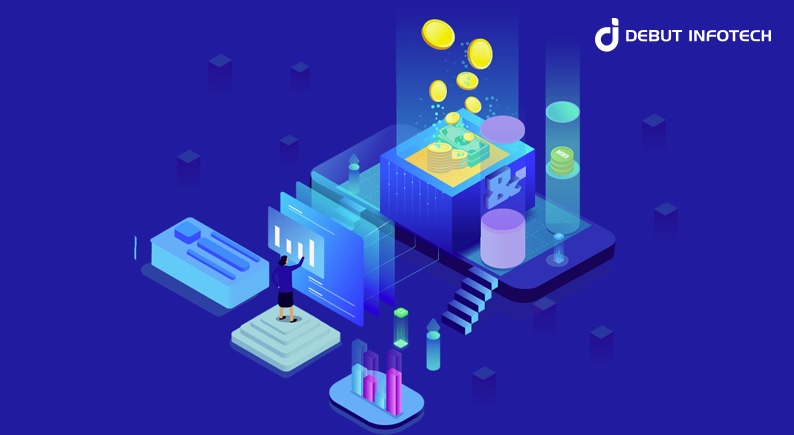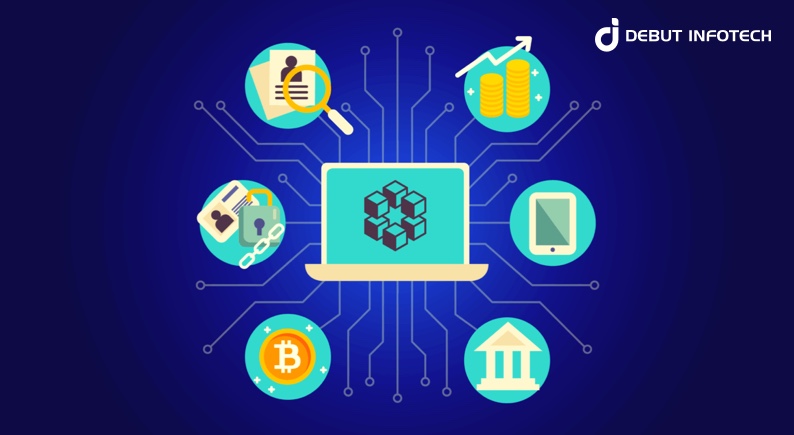Table of Contents
Home / Blog / Blockchain
What Are the Benefits of Blockchain in Government Sectors?
December 21, 2023

December 21, 2023
Blockchain technology and its emergence have transformed how we carry out financial transactions. Storing information on blockchain technology has become convenient with its unbreakable and top-notch security system, proving blockchain for the government to be a milestone.
With several applications in the finance industry, including cryptocurrency, Non-Fungible Tokens (NFTs), and more, blockchain has attracted people’s attention due to its excellence in security and transparency. Therefore, governments should opt to roll out blockchain-based applications, including eVoting, digital identity, and highly secure land registration information.
With that, let’s have a quick look at blockchain technology and its various applications, ranging from the benefits of blockchain technology for the government to its uses and public sector institutions. Furthermore, we will explore multiple examples reflecting the perks of blockchain for government institutions. Lastly, you will also learn about the future of blockchain for digital governments. Before any further ado, let’s get started:
Benefits of Blockchain for Government
States’ Governments are responsible for taking charge of sensitive information, which may be vulnerable to hackers and scammers. This vulnerability can put thousands of civilians in danger of losing their privacy and delicate data at the hands of malicious actors. Therefore, countries must shift their data storage to blockchain for government services.
The existing system of government is centralized, meaning that third-party private authorities and institutions have access to their database. This government system slows the state’s productivity, leading to insecurity and inefficient operability. Therefore, blockchain technology is an excellent tool to combat the loopholes in state affairs.
With blockchain technology for government, countries can manage their data with an additional layer of security that keeps cyber-terrorists away from accessing government assets. Using this technology offers several perks to countries, helping them organize state affairs. Here are a few of them:

1. Blockchain Against Corruption
Since worldly matters shift dramatically toward digital operation, blockchain for digital government will reduce the demand for intermediaries in government policies and working persona. It will also lead to an independent and transparent record-keeping strategy for the government.
A smart contract is the fundamental tool through which government organizations can fight corruption and misuse of state resources. Blockchain-powered smart contracts consist of modern programming applications where algorithms perform the requisite work for an organization after the system meets specific conditions. Smart contracts highlight the vitality of the Decentralized Finance (DeFi) model.
Corruption and unauthorized access to public information become challenging tasks due to the four traits of blockchain-based smart contract functionality. They include the open-source nature of the information with active global accessibility. Furthermore, it also offers comprehension of the data coupled with interoperability on various networks, ensuring the auditability and transparency of public affairs.
2. Blockchain for Government Digital Identity
The surge in technological usage has resulted in convenient business matters followed by a risk of cyber threats from malicious actors globally. Cybercrime casualties grow with criminal incidents, costing billions of US dollars to individuals and governments. As per statistics, the worldwide cyberattack incidents surpassed 100,000 worldwide in December 2023.
This growing number of losses reflects the immense need for instilling a secure cybersecurity system in government organizations to reinstate civilian trust. Blockchain is the best technology with its tamper-proof record-keeping mechanism. With its Distributed Ledger Technology (DLT), government services can register digital identities on a blockchain.
This way, government institutions enter a network that verifies participants’ credentials. They can alter the data without exposing the entire database to unauthorized access or fraudulent activities. Therefore, blockchain provides states with a shared record-keeping strategy, cutting off the need for a central authority.
3. eVoting for Government Through Blockchain Technology
Electoral integrity or fair election conduct is one of the challenges every government faces, regardless of its developmental status quo. Elections make up the foundation for the democratic well-being of a country, making it an essential aspect of government affairs. In many countries, voters lack accessibility to their polling rights. Therefore, intelligent solutions concerning fair elections are the need of the hour.
Luckily, blockchain for governance includes eVoting services, allowing citizens of a country to entertain their right to vote in a fair and transparent ecosystem. Since blockchain offers decentralized, open-source, and encrypted qualities, an electoral system based on blockchain will refrain governments from election tampering.
It is the only way to enhance public sector institutions, as fair elections will lead to a transparent and merit-based government with controlled voter manipulation. Furthermore, voters will become independent in their exercise of voting with blockchain-based voting systems. It is the way ahead to having electoral integrity and transparency.
The Use Cases of Blockchain for Government and Public Services
When discussing the blockchain for government organizations, a question may strike your mind: Which type of blockchain is concentrated for government sector bodies? Understanding the multiple forms of the blockchain, including public, private, consortium, and hybrid blockchains, is a must.
The widely used form of blockchain governments can use public blockchain since it offers independence and transparency. Cryptocurrency and data validation are some of the real-world applications of public blockchain. Another type of blockchain for government sectors may also be a private blockchain with access control and improved performance. This type of blockchain is the best for areas like supply chain and asset ownership.
Furthermore, hybrid blockchain adds to the scalability of its applications, resulting in the safekeeping of medical records and real estate ownership with intangible assets. Lastly, the consortium has the best security regarding database safety, making it an essential technology for banking, research, and supply chain industries.

Let’s have a brief understanding of blockchain for government and public services:
1. Facile Land Registry
Land registration is an integral component of real estate. Conventional land registration exposes individuals and organizations to several difficulties, resulting in an enhanced restriction for investors. Due to this reason, a few investors make their way into the real estate market, affecting it adversely.
On the flip side, blockchain-based land registration is a comprehensive, fast, and transparent process, mitigating almost every odd of the real estate industry. Apart from storing information on the land for buyers and investors, blockchain for government also offers tokenization of property ownership.
The tokenization of real estate comes under the umbrella of Real-World Assets (RWA) tokenization. It allows users to trade their ownership in fractions, paving the path for small-scale investors. Furthermore, it reduces the multiple layers, which adds to the price of property and land. With blockchain land registry, the additional cost for the land registry will dramatically come down.
2. Government Medical Care Facilitation
Every country has a particular share of its Gross Domestic Product (GDP), which counts for its annual income, to the public healthcare sector. These funds strengthen medical care nationwide for every person, regardless of age and gender. However, the growing ailments and health complications have resulted in a rise in medical expenditure, weighing the shoulders of government medical care facilities.
Besides the growing expenses, public healthcare often falls prey to data theft and hackers, impacting public trust in government services. Blockchain has an impressive solution since it connects the medical database to the blockchain network. It reduces the possibility of data breaches that affect doctor-patient confidentiality.
Electronic Medical Record (EMR) is the application of blockchain for healthcare improvement and digital data security of the public sector medical care institutions. Furthermore, DLT aids hospitals and medical care bodies in controlling pandemic outbreaks effectively. Personal health data management is another aspect of blockchain for government healthcare development services where patients manage their data.
3. Blockchain-Powered Government Procurement
Public sector bodies often lag in development and progress, making it a central discussion in every government meeting. An effective government procurement holds a vital role in the improvement of public sector functionality.
Procurement refers to the efficient management of manufacturing, finances, and daily operations of government institutions. Blockchain for government procurement can elevate the outcomes of the institutions by cutting off ties with third-party private intermediaries. This way, the government’s data, including assets, personal information, strategies, policies, and more, is saved directly onto a blockchain ledger.
Thus, government stakeholders have access to the data on the network, promoting transparent operation. However, they don’t have the authority to make changes to the data, which makes the database free from vulnerabilities and damages. In essence, smart contracts further strengthen data security, alleviating the manual intervention in government procurement.
Real-World Examples of Blockchain Technology for Governance

Blockchain technology for government is progressing, with the technology going through experimental phases of development and improvement. Despite its early stages, global spending on blockchain-based technologies in various sectors will reach around 19 billion USD by 2024. Public sector institutions of developing countries leave no stone unturned to streamline their government affairs with modern-day technology.
We have gathered many case studies portraying various countries working to implement blockchain solutions in their mainstream operation. Without any further ado, let’s unravel the list of countries with real-world applications of blockchain for government:
1. Republic of China
The Chinese government always faces restrictions and sanctions from countries such as the US. However, their thirst for abrupt growth in the technology space never ends, resulting in a useful contribution to the advanced technology.
A digital yuan is a blockchain-based alternative to China’s national paper currency. The cashless payment system and its strategic implementation are the top priority for China, helping it mitigate currency scams and inflation up to a significant extent.
2. The United Kingdom
The UK is among those countries that equipped blockchain for government operations, including law enforcement, smart payment options, etc.
GovCoin System is the UK government’s initiative to benefit from the perks of blockchain. The system aids citizens in using cryptocurrency for their daily chores in an automated and organized manner. It acts like a circumvent bank, coming in handy in emergency and needful times.
In addition, Elliptic is a UK-based blockchain analytics and forensic investigation toolkit provider. It helps law enforcement organizations of the UK government keep track of and restrict criminal activities, including drug trafficking, tax evasion, etc. Thus, blockchain for government services offers numerous real-time benefits to strengthen public affairs.
3. The United States
Blockchain for the government’s digital identity project is a massive success in developing countries, reducing data breaches across public sector institutions. The US initiated the Department of Homeland Security’s Digital Identity. This project utilizes the modern-day applications of blockchain, transforming the safety of US citizens’ e-identities.
Furthermore, the United Nations in New York has an aid delivery body, the UN World Food Program. It empowered the Ethereum blockchain technology to devise the Building Blocks platform. Upon experimentation of the platform, the UN delivered crypto-backed food vouchers to thousands of refugees, summing up to a total cash assistance of 325 million USD.
4. United Arab Emirates
UAE is a global tourism hub, contributing a large sum of income to the GDP of the United Arab Emirates. Last year, the government travel and tourism sector of UAE made around AED 167 billion, making approximately 9 percent of the total GDP. However, the government does not stay there but evolves to lay its hands on advanced technologies, including artificial intelligence (AI), blockchain, etc.
UAE’s Blockchain Strategy 2021 plays a crucial role in the country’s futuristic approach to strengthening its economy further by utilizing blockchain’s convenient and efficient characteristics. It acquired blockchain for government processes to streamline their tracking of goods and the propagation of digital currency across the state.
Conclusion
In government services, blockchain’s emergence as a beacon of security and transparency has redefined operational landscapes. Its applications, from eVoting to secure digital identities and streamlined land registries, promise unparalleled efficiency and integrity.
At Debut Infotech, we champion the potential of blockchain. As experts in enterprise blockchain development, our seasoned team specializes in tailored solutions, from blockchain and exchange development to DApp creation. We empower businesses to harness the transformative power of this technology, offering precise, industry-specific solutions. Our vetted team of blockchain app developers is primed to collaborate and craft bespoke solutions. Contact us today to discuss how blockchain can revolutionize your business’s trajectory.
Are you curious to know more about the blockchain? Read our previous blog to get up-to-date blockchain information.
FAQs
Q. What are the advantages of blockchain for the government sector?
Blockchain is the way forward in the modern era, and government services must comply with this technology for efficient and cost-effective government procurement. Its tamper-free data storage guarantees the mitigation of data breaches.
Q. What is the future of blockchain in government services?
The future of blockchain relies on the present adoption of the technology. Since several countries strive to advance in the blockchain game, the future seems to belong to secure and efficient technology.
Q. What are the applications of blockchain in government?
Various countries, including the US, UAE, Chile, Denmark, etc., employ blockchain-powered applications to boost foreign aid, improve their regulatory institutions, promote timely medical care, and streamline their government affairs.
Q. Can Blockchain Technology Improve Healthcare Services in the Public Sector?
Yes, blockchain secures medical data, ensuring confidentiality and integrity. It aids in efficiently managing personal health records, controls pandemics, and enhances overall healthcare efficiency.
Q. What are Real-world Examples of Successful Blockchain Integration in Government Affairs?
Several countries like China, the UK, the US, and the UAE have implemented blockchain for digital currencies, law enforcement, aid delivery, and streamlined government processes. These examples showcase blockchain’s diverse applications and success in public sector operations.
Talk With Our Expert
Our Latest Insights
USA
Debut Infotech Global Services LLC
2102 Linden LN, Palatine, IL 60067
+1-708-515-4004
info@debutinfotech.com
UK
Debut Infotech Pvt Ltd
7 Pound Close, Yarnton, Oxfordshire, OX51QG
+44-770-304-0079
info@debutinfotech.com
Canada
Debut Infotech Pvt Ltd
326 Parkvale Drive, Kitchener, ON N2R1Y7
+1-708-515-4004
info@debutinfotech.com
INDIA
Debut Infotech Pvt Ltd
Sector 101-A, Plot No: I-42, IT City Rd, JLPL Industrial Area, Mohali, PB 140306
9888402396
info@debutinfotech.com



Leave a Comment